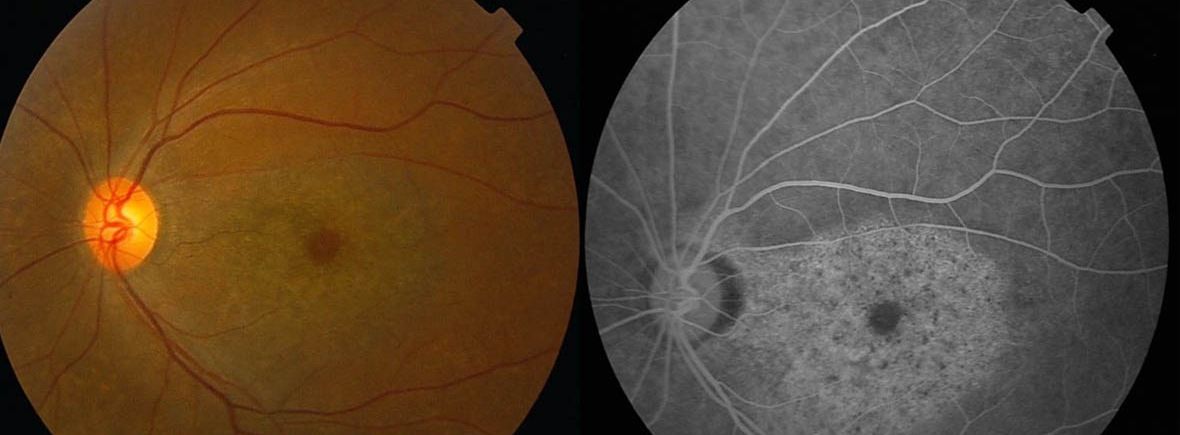Chloroquine retinopathy
Editor-In-Chief: Prab R Tumpati, MD
Obesity, Sleep & Internal medicine
Founder, WikiMD Wellnesspedia &
W8MD medical weight loss NYC and sleep center NYC
| Chloroquine retinopathy | |
|---|---|

| |
| Synonyms | Bull's-eye maculopathy |
| Pronounce | N/A |
| Specialty | N/A |
| Symptoms | Visual impairment, color vision changes, night blindness |
| Complications | Permanent vision loss |
| Onset | Typically after long-term use of chloroquine or hydroxychloroquine |
| Duration | Progressive |
| Types | N/A |
| Causes | Accumulation of chloroquine in the retina |
| Risks | High cumulative dose, long duration of use, pre-existing retinal disease |
| Diagnosis | Ophthalmic examination, visual field test, optical coherence tomography (OCT), fundus autofluorescence |
| Differential diagnosis | Age-related macular degeneration, Stargardt disease, cone dystrophy |
| Prevention | Regular eye examinations, dose adjustment |
| Treatment | Discontinuation of chloroquine or hydroxychloroquine |
| Medication | N/A |
| Prognosis | Variable; early detection can prevent progression |
| Frequency | Rare |
| Deaths | N/A |
A condition caused by the use of chloroquine, affecting the retina of the eye
Chloroquine retinopathy
Chloroquine retinopathy, also known as hydroxychloroquine retinopathy, is a retinal disorder caused by the use of the antimalarial drugs chloroquine and hydroxychloroquine. These medications are commonly used in the treatment of rheumatoid arthritis, systemic lupus erythematosus, and other autoimmune diseases. The condition is characterized by damage to the retina, particularly the macula, which can lead to vision loss if not detected early.
Pathophysiology
Chloroquine and hydroxychloroquine are known to bind to melanin in the retinal pigment epithelium (RPE), leading to toxic effects on the retina. The accumulation of these drugs in the RPE can cause damage to the photoreceptor cells and the RPE itself, resulting in the characteristic "bull's-eye" maculopathy seen in advanced cases.
Clinical features
Patients with chloroquine retinopathy may initially be asymptomatic. As the condition progresses, they may experience symptoms such as:
- Blurred vision
- Difficulty reading
- Decreased color vision
- Paracentral scotomas (blind spots)
The classic "bull's-eye" maculopathy is a late finding and indicates significant retinal damage.
Diagnosis
The diagnosis of chloroquine retinopathy is primarily clinical, supported by various imaging techniques. These include:
- Fundus photography: To document changes in the retina.
- Optical coherence tomography (OCT): To detect early structural changes in the retina.
- Visual field testing: To identify functional deficits.
- Fundus autofluorescence: To detect early RPE damage.
- Multifocal electroretinography (mfERG): To assess retinal function.
Management
The primary management strategy for chloroquine retinopathy is the early detection and cessation of the offending drug. Once significant retinal damage has occurred, it is often irreversible. Regular screening is recommended for patients on long-term chloroquine or hydroxychloroquine therapy to detect early signs of retinopathy.
Prevention
Preventive measures include:
- Baseline ophthalmologic examination before starting therapy.
- Regular follow-up examinations, typically annually, after five years of therapy or sooner if risk factors are present.
- Dose adjustment based on ideal body weight to minimize risk.
Prognosis
The prognosis of chloroquine retinopathy depends on the stage at which it is detected. Early detection and drug cessation can prevent progression and preserve vision. However, once advanced retinopathy has developed, the visual prognosis is poor.
See also
Transform your life with W8MD's budget GLP-1 injections from $125.
W8MD offers a medical weight loss program to lose weight in Philadelphia. Our physician-supervised medical weight loss provides:
- Most insurances accepted or discounted self-pay rates. We will obtain insurance prior authorizations if needed.
- Generic GLP1 weight loss injections from $125 for the starting dose.
- Also offer prescription weight loss medications including Phentermine, Qsymia, Diethylpropion, Contrave etc.
NYC weight loss doctor appointments
Start your NYC weight loss journey today at our NYC medical weight loss and Philadelphia medical weight loss clinics.
- Call 718-946-5500 to lose weight in NYC or for medical weight loss in Philadelphia 215-676-2334.
- Tags:NYC medical weight loss, Philadelphia lose weight Zepbound NYC, Budget GLP1 weight loss injections, Wegovy Philadelphia, Wegovy NYC, Philadelphia medical weight loss, Brookly weight loss and Wegovy NYC
|
WikiMD's Wellness Encyclopedia |
| Let Food Be Thy Medicine Medicine Thy Food - Hippocrates |
Medical Disclaimer: WikiMD is not a substitute for professional medical advice. The information on WikiMD is provided as an information resource only, may be incorrect, outdated or misleading, and is not to be used or relied on for any diagnostic or treatment purposes. Please consult your health care provider before making any healthcare decisions or for guidance about a specific medical condition. WikiMD expressly disclaims responsibility, and shall have no liability, for any damages, loss, injury, or liability whatsoever suffered as a result of your reliance on the information contained in this site. By visiting this site you agree to the foregoing terms and conditions, which may from time to time be changed or supplemented by WikiMD. If you do not agree to the foregoing terms and conditions, you should not enter or use this site. See full disclaimer.
Credits:Most images are courtesy of Wikimedia commons, and templates, categories Wikipedia, licensed under CC BY SA or similar.
Contributors: Prab R. Tumpati, MD


